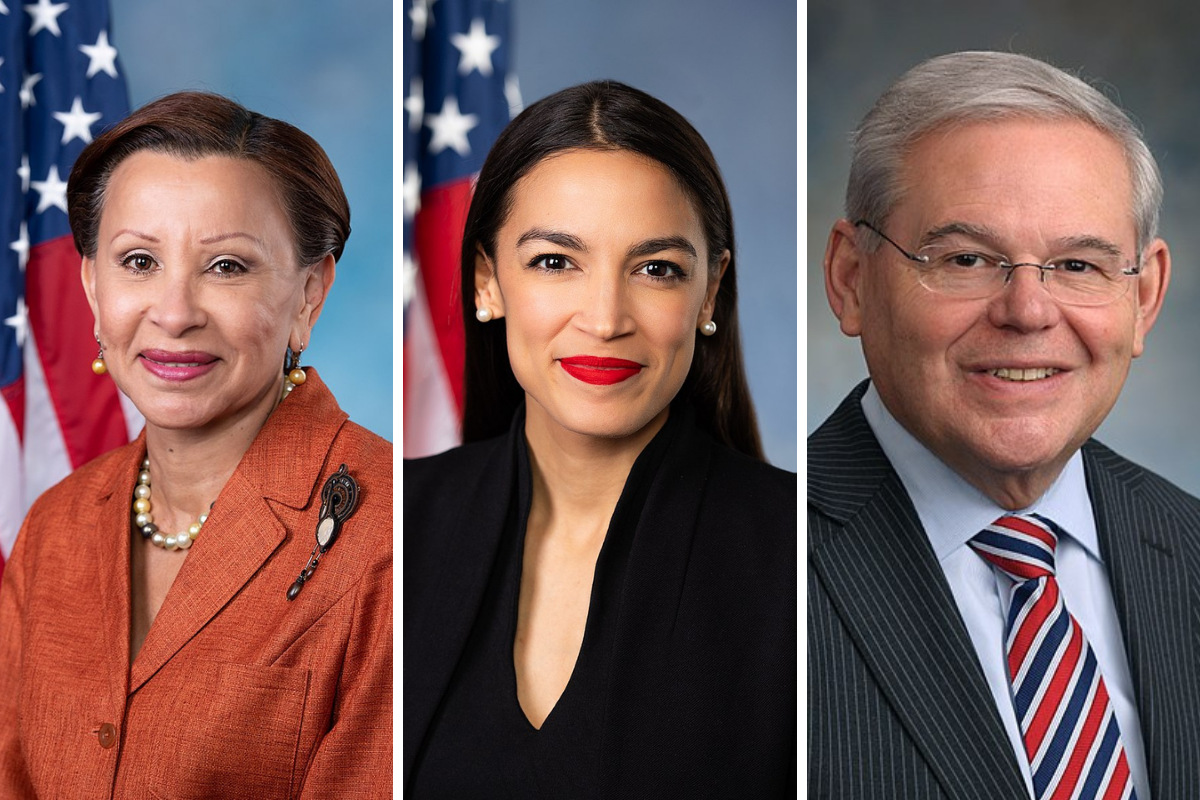

Led by Reps. Nydia Velázquez (D-NY) and Alexandria Ocasio-Cortez (D-NY) in the House of Representatives and Sen. Bob Menendez (D-NJ) in the Senate, a total of 83 congressional members sponsored the Thursday bicameral introduction of the Puerto Rico Self-Determination Act of 2021.
“Over a century ago, the United States invaded Puerto Rico. And ever since the U.S. has pursued its own colonial rule,” Velázquez said. “While many may disagree about the future of Puerto Rico’s status, we must recognize that the decision should come from those who will be impacted most: the people of Puerto Rico.”
The 2021 version of the act (a previous act was submitted in 2020) calls for “legislation that would empower Puerto Ricans with an inclusive and democratic process to determine their own political future and relationship with the United States,” a release about the act said.
“Under this proposed legislation, a status convention would be created and delegates would be elected to discuss options with federal officials, and therefore create an official, legitimate and comprehensive bilateral conversation on status,” the release added.
Supporters of the act listed 81 Democrats, including prominent senators and former Democratic presidential candidates Sens. Elizabeth Warren (D-MA), Cory Booker (D-NJ) and Kirsten Gillibrand (D-NY). Another former Democratic presidential candidate, Sen. Bernie Sanders (I-VT) also sponsored the bill.
“For too long, the people of Puerto Rico have faced inadequate assistance and colonial exploitation in the wake of natural disasters, crippling economic crises, and unjust human suffering,” Sanders said. “The people of Puerto Rico deserve the right to decide their own future. They deserve the right to have their voices be equally heard in governance and elections. I am proud to join my colleagues on this bill that returns the self-determination of that future back to the people of Puerto Rico.”
Sens. Ed Markey (D-MA) and Sherrod Brown (D-OH) are the other two Senate Democrats who sponsored the bill.
Sen. Roger Wicker (R-MS) is the sole Republican.
“The people of Puerto Rico have a right to determine their future status in a fair and democratic process,” Wicker said. “The Puerto Rico Self-Determination Act would provide a comprehensive mechanism for Puerto Rico’s democratically-elected representatives to consider all options for the political future of the island and negotiate a permanent outcome that reflects the will of the people.”
The bill also earned the early support of prominent progressive organizations, like the National Urban League and Indivisible.
Ten of the House sponsors are committee chairs. They are Velázquez, Rep. Jerry Nadler (D-NY), Rep. Bennie Thompson (D-MS), Rep. Carolyn Maloney (D-NY), Rep. Richard Neal (D-MA), Rep. Maxine Waters (D-CA), Rep. Jim McGovern (D-MA) and Rep. Bobby Scott (D-VA). Other prominent House supporters include Rep. Adam Schiff (D-CA), Rep. Ro Khana (D-CA), Rep. Joaquín Castro (D-TX), Rep. Ilhan Omar (D-MN), Rep. Rashida Tlaib (D-MI), Rep. Ayanna Pressley (D-MA) and Rep. Jesús “Chuy” García (D-IL).
A Thursday press conference about the act was held at the Capitol. Part of it was live-streamed on Twitter through Velázquez’s account.
— Rep. Nydia Velazquez (@NydiaVelazquez) March 18, 2021
— Rep. Nydia Velazquez (@NydiaVelazquez) March 18, 2021
“A colony is incompatible with democracy. It’s incompatible with full citizenship, and we should all be able to enjoy the right to vote for our leaders,” Ocasio-Cortez said during the press conference. “We should all be able to enjoy the right to equal treatment, and self-determination is how we can accomplish that in a process that is respected by all.”
Similar to the statehood bill, though, Senate Majority Leader Chuck Schumer (D-NY) and Speaker of the House Nancy Pelosi (D-CA) have not formally supported the self-determination bill, although Velázquez did suggest at the Thursday press conference that more was to come about that, especially if more Democrats united around the bill. Earlier this year, Schumer emphatically indicated that he would not support a statehood bill, although since then he has toned down his position.
Minutes after the Thursday press conference, Velázquez’s office gave Latino Rebels the official tally of sponsors at the time. Castro was added to this list after it was shared.
The self-determination act is a clear response against a statehood bill submitted to the House on March 2 by Resident Commissioner Jenniffer González-Colón (R-PR) —Puerto Rico’s non-voting member of Congress— and Rep. Darren Soto (D-FL). That bill currently has 57 House sponsors, including 12 Republicans. That statehood bill’s overall goal is to have Congress accept the results of a non-binding November 2020 plebiscite, which statehood won, 52%-48%. If passed, it would result in a ratification vote by the people of Puerto Rico to accept admission into the Union.
On Wednesday, the day before the Puerto Rico Self-Determination Act of 2021 was introduced, Sen. Martin Heinrich (D-NM) announced that he had submitted the Senate version of the statehood bill with Sens. Ron Wyden (D-OR), Brian Schatz (D-HI) and Alex Padilla (D-CA).
That’s why I’m proud to join @RepJenniffer and @RepDarrenSoto and our bicameral coalition of @SenBrianSchatz, @RonWyden, and @SenAlexPadilla to introduce the Puerto Rico Admission Act in the Senate.
— Martin Heinrich (@MartinHeinrich) March 17, 2021
Meanwhile, Gonzaléz-Colón and Soto co-published a Thursday opinion piece in The Hill insisting that a statehood bill is the only course for Puerto Rico. Statehood advocated also took to social media and sent letters to congressional committee leaders to support the statehood bill.
51 organizations that represent the Puerto Rico statehood movement today sent a letter to @RepRaulGrijalva @RepWesterman @SenJohnBarrasso @Sen_JoeManchin urging their support for the Puerto Rico Statehood Admission Act that honor the will of Puerto Rico voters. pic.twitter.com/00ptjmNnur
— Puerto Rico Star Project (@PRStarProject) March 18, 2021
Later on Thursday, Gonzaléz-Colón issued a lengthy statement condemning the self-determination act.
“There is nothing more colonial in nature than imposing other’s views over us. The legislation looks to delegate Puerto Rico’s future to a select few, instead of allowing the majority to decide for themselves,” Gonzaléz-Colón said. “Those who wish to silence the majoritarian vote and the will of the people of Puerto Rico are those that stand in the way of our future and progress. It is up to those of us who believe in Puerto Rico and our quest for equality to fight for what we deserve.”
“A rule we follow in Congress is that no member legislates on issues outside of their corresponding district, at least not without the endorsement of the person duly elected by the voters of said district,” González-Colón added later in the statement.
The pro-statehood governor of Puerto Rico, Democrat Pedro Pierluisi, tweeted the following in opposition to the self-determination bill:
Puerto Rico chose statehood.
Puerto Rico chose their preferred method of self determination.
Puerto Rico will not stand for #inequality. #Statehood— Pedro R. Pierluisi (@pedropierluisi) March 18, 2021
Puerto Rico voted in their preferred method of self determination and chose statehood. #Statehood #Equality
— Pedro R. Pierluisi (@pedropierluisi) March 18, 2021
In an appearance with Latino Rebels Radio on Thursday morning, Velázquez said that “Pierluisi does know how serious I am to resolve this political limbo the Puerto Rican people find themselves in.”
Velázquez, who was born and raised in Yabucoa, Puerto Rico, also added that she did speak directly to González-Colón.
“I said to [González-Colón], ‘Look, are we going to be serious about coming together and resolving this issue, or are we going to continue to take the attitude of ‘it’s my way or the highway?’ And I said to her that self-determination is not a process that will deny statehood. It’s a process that will allow for everyone, every faction, every sector in Puerto Rico to participate and determine for themselves the political future of Puerto Rico,” Velázquez said.
“The principled position —especially for the head of that colonizing power— is to say that people should have a process of self-determination and to not put your thumb on the scale of one direction or another. Our bill outlines a just, democratic, and inclusive process for Puerto Ricans to decide their future,” Ocasio-Cortez said.
Before the 2020 non-binding plebiscite, there were two other plebiscites since 2012. In the non-binding plebiscite of 2012, Puerto Ricans rejected the island’s current Commonwealth status and chose statehood. In a 2017 non-binding plebiscite, 97% of voters chose statehood, although the total vote was the lowest vote for statehood since 1967. Both the 2012 and 2017 plebiscites were boycotted by non-statehood advocates, although the 2020 vote was not. All three non-binding plebiscites have been criticized as being political tools of the island’s pro-statehood party.
That criticism has led to the push of a self-determination bill, first introduced last year by Vázquez and Ocasio-Cortez. That 2020 version went through revisions that were included in the 2021 bill submitted on Thursday. The release about the 2021 version included a summary of how the bill looks like now:
- Creation of Status Convention: The bill proposes creating a “status convention” made up of delegates elected by Puerto Rican voters who would come up with a long-term solution for the island’s territorial status—whether that be statehood, independence, a free association or any option other than the current territorial arrangement.
- Delegate election: Once the number of delegates is determined, voters will decide who will serve on the delegation. The delegate election will be publicly financed. In order to keep dark money out of this election, a Puerto Rico Status Convention Public Matching Fund will be established, and it will be subject to the Federal Election Commission.
- Delegate collaboration with a Bilateral Negotiating Commission: A Bilateral Negotiating Commission composed of several members of Congress and the administration will be created to provide advice and consultation to delegates regarding the different status options.
- Referendum vote: A referendum vote, where the status options will be presented by the delegates to the people of Puerto Rico, will then be held following the collaboration between the delegates and the Bilateral Negotiating Commission. An allocation of $2.5 million dollars to the Puerto Rico State Commission on Elections will be appropriated to execute said referendum. Additionally, delegates shall carry out an education campaign through traditional paid media related to the referendum under this section. An appropriation of $5 million dollars is authorized to carry out said campaign.
- Congressional Recognition: If the referendum under the Act is approved by the people of Puerto Rico, Congress shall approve a joint resolution to ratify self-determination option as approved in the referendum vote.
Another part of the proposed bill said that the referendum vote may be “conducted in a ranked-choice voting format in which voters rank choices by preference on their ballots without a limit on the number of choices ranked.” Last week, an analysis of ranked-choice voting in Puerto Rico conducted by Data for Progress concluded that such a format would lead to a statehood preference overall.
As for the legislative futures of the self-determination bill and the statehood bill, it is too early to conclude where they will go next, but many veteran observers of Puerto Rico’s political status debates are noting that since both the bills have significant numbers of sponsors, this current session of Congress might move the needle a bit on the island’s political relationship with the United States. The competing bills also indicate a split with Democrats about the status question with relatively very little Republican sponsorship support.
According to a March 3 quote by White House press secretary Jen Psaki, the official position by the Biden administration is that “The President supports a referendum in Puerto Rico for the people of Puerto Rico deciding the path forward.”
The following is the Senate version of the self-determination bill:
***
Julio Ricardo Varela is founder and publisher of Latino Rebels, part of Futuro Media. He tweets from @julito77.



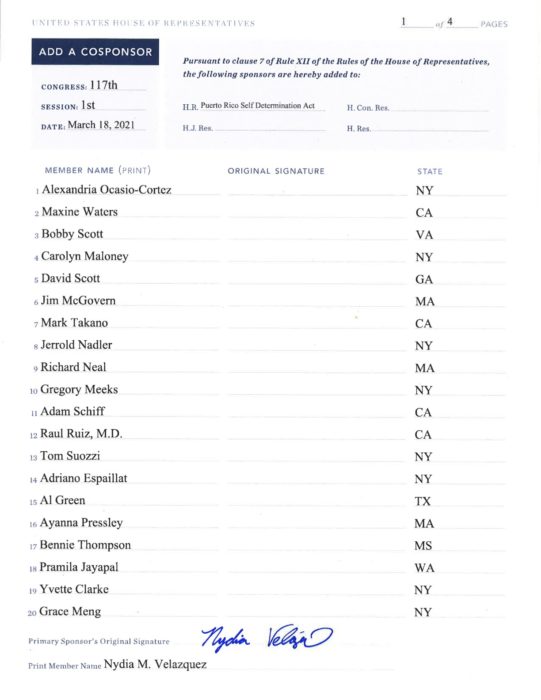
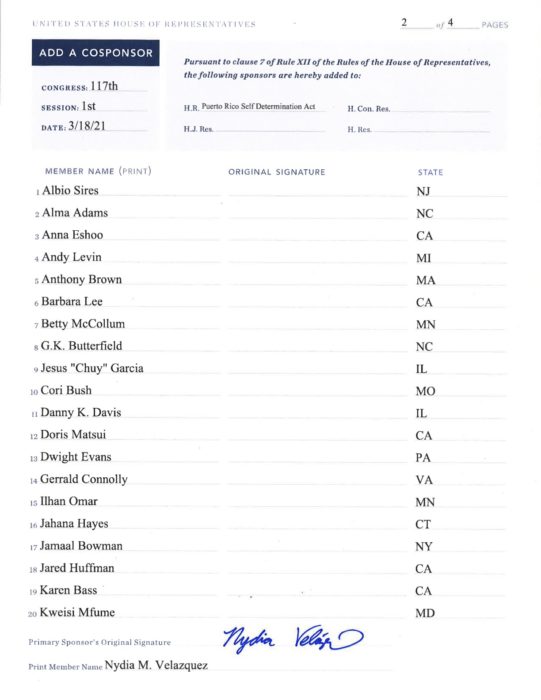
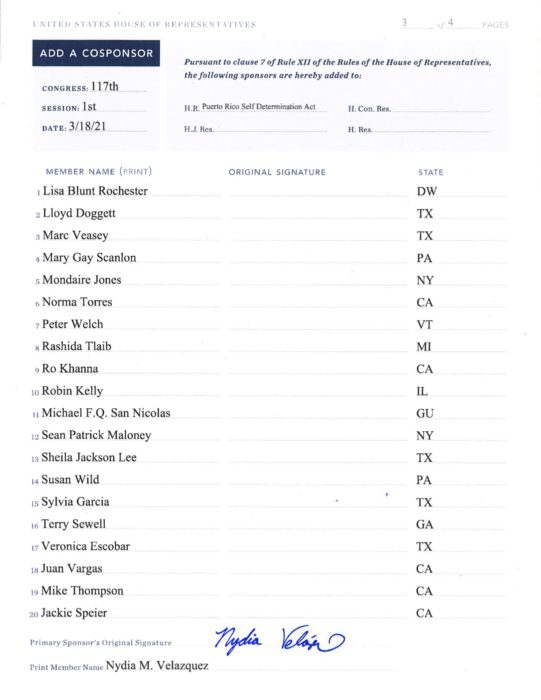
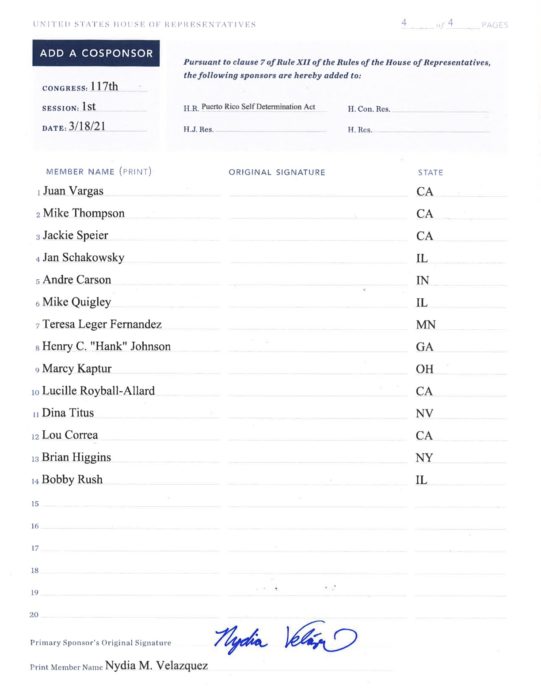
Yo les pido a esas personas que apoyan lo que dice la representante del pueblo de Puerto Rico como se consiguieron esas supuesta ventaja para la estalidad lean las leyes que ellos quearon para esos plevisisto y veran los trucos anti democraticos que emplearon
[…] today on Capitol Hill whether she favored either the 2021 Puerto Rico Statehood Admission Act or the Puerto Rico Self-Determination Act of 2021 bills that were each formally submitted to Congress last […]
[…] month, Representatives Nydia Velazquez, Alexandria Ocasio Cortez and Senator Bob Menendez introduced a 2021 version of the Puerto Rico Self-Determination Act. Compared to the first version from 2020, […]
[…] Nancy Pelosi and Senate Majority Leader Charles Schumer if they favored the statehood bill or the competing self-determination bill introduced by Rep. Nydia Velázquez (D-NY) and co-sponsored Alexandria Ocasio-Cortez (D-NY). That […]
[…] According to a March 18 release about the act, H.R. 2070 promotes “legislation that would empower Puerto Ricans with an inclusive and democratic process to determine their own political future and relationship with the United States,” where “a status convention would be created and delegates would be elected to discuss options with federal officials, and therefore create an official, legitimate and comprehensive bilateral conversation on status.” […]
[…] Puerto Rico Self-Determination Act is sponsored by Reps. Nydia Velázquez and Alexandria Ocasio-Cortez (D-NY) and Sen. Bob Menendez […]
[…] difference between the two bills is that the Puerto Rico Self Determination Act would create a “convention to discuss options with federal officials, the definition of slow […]